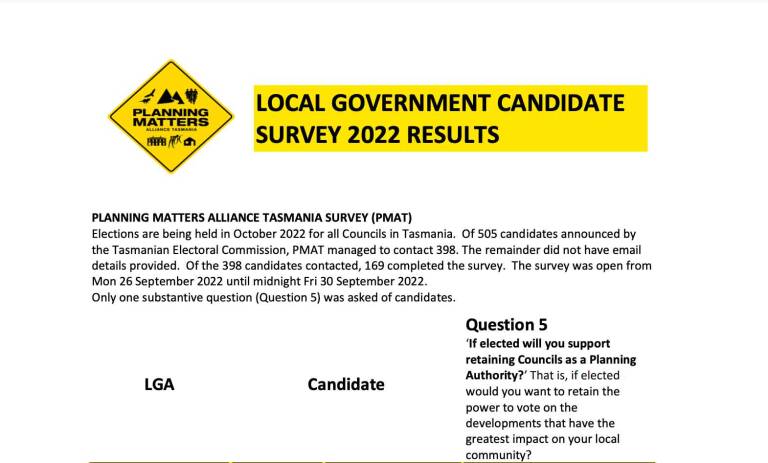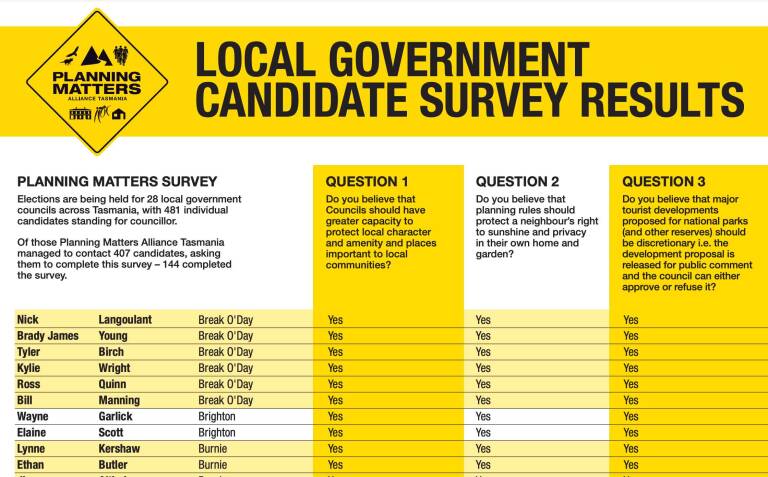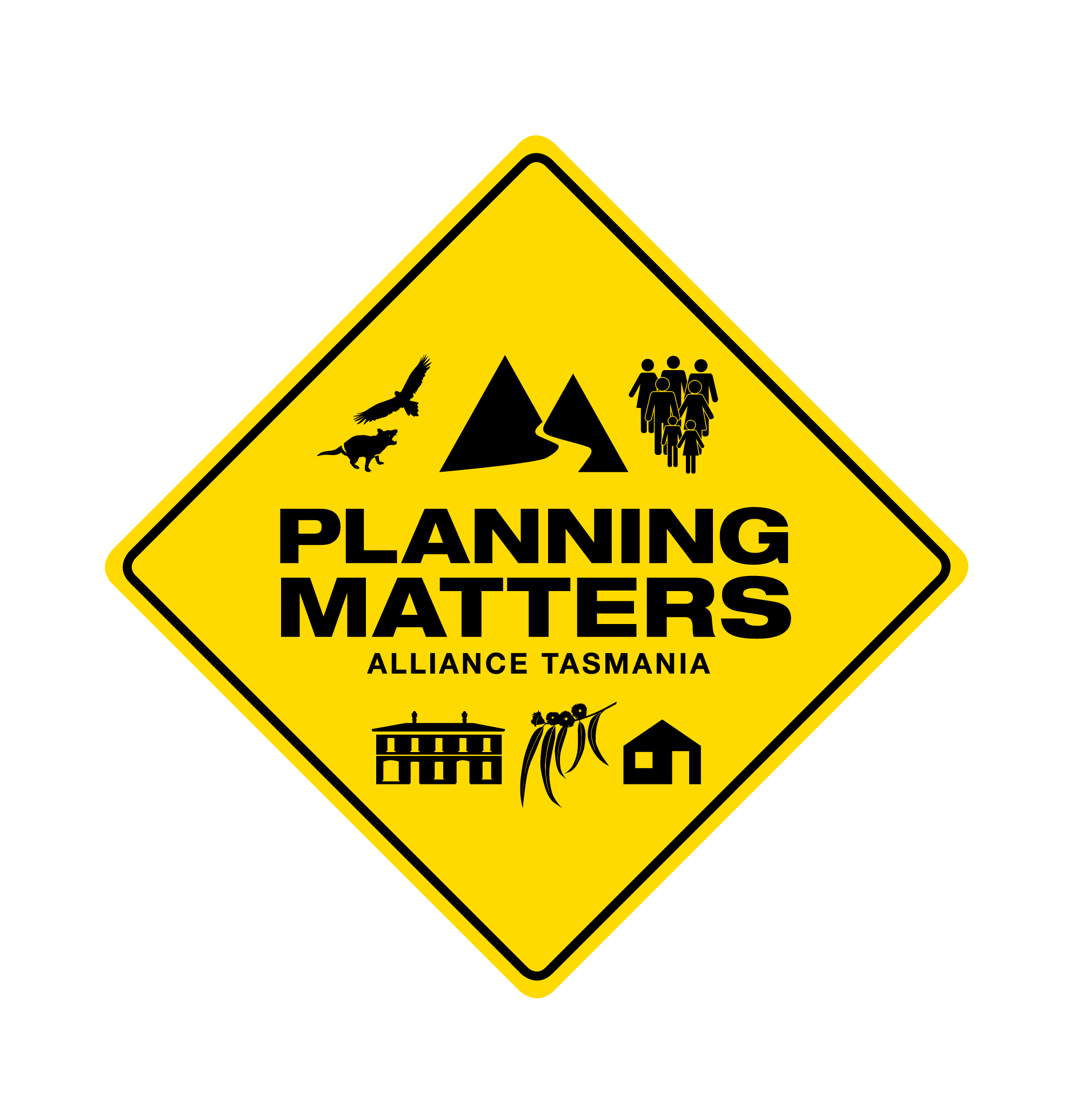Local Government Elections
Summary
Democracy cannot function without communication. If voters are to make informed choices among candidates, they must have the opportunity to learn about candidates’ policy positions. During the last two Local Government elections PMAT surveyed candidates to ask their position on planning.
PMAT's Key Concerns
- No compulsory requirement for all Local Government election candidates to provide their contact details to the Tasmanian Electoral Commission. Obtaining candidate email addresses is difficult, time consuming and in many instances impossible within election timeframes. Democracy cannot function without communication. To make informed choices among candidates, voters must be able to learn about candidates’ policy positions.
- Tasmania is the only state in Australia with no political election campaign donation disclosure requirements for all local council candidates. New candidates have no requirements to disclose election campaign donations, while sitting councillors are currently required to disclose (specified amounts of) donations and gifts during both electoral and non-electoral periods. This means new candidates who are currently not sitting on council will not have to disclose their political donations creating an unfair playing field.
- As at August 2021, most Tasmanian councils were in breach of rules for disclosure of gifts and donations, which raises questions about the lack of effective oversight by the State Government.
PMAT's Key Recommendations
- All election candidates must provide their contact details, including their email address, to the Tasmanian Electoral Commission.
- All Local Government election candidates’ contact details, including their email address, must be made publicly available, in a timely and easily accessible format e.g. by both spreadsheet and PDF.
- Improve the administration of the General Manager’s Roll (i.e. ratepayers who live outside the council area). The Tasmanian Electoral Commission should reverse their 2022 decision to not provide postal addresses of eligible voters enrolled on each Council’s General Manager’s Roll. This decision, which was not communicated to candidates, excludes many ratepayers from receiving candidate election materials.
- Local councils should retain their role as a Planning Authority. The overwhelming majority of local council candidates who took part in PMAT’s 2022 Local Government Election planning survey believe local councils should retain their role as a Planning Authority. That is, councils should retain the power to vote on the developments that have the greatest impact on their local community. They do not want to give up this right to represent their local communities.
- Councils should have greater capacity to protect local character and amenity and places important to local communities. The overwhelming majority of local council candidates who took part in PMAT’s Local Government Election 2018 planning survey believe local councils should have greater capacity to protect local character and amenity and places important to local communities. They believe major tourist developments in National Parks should be released for public comment, and that local councils should have the final approval (with opportunity for merit-based planning appeals). There was also overwhelming support for planning rules to protect people’s right to privacy in their own home.
Background
Every four years, residents, and ratepayers in each of Tasmania’s 29 council areas elect councillors to represent them. Each council has between 7 and 12 councillors, including a mayor and deputy mayor.
The next Local Government elections will be held in September 2026.
Local government elections are held by full postal ballot. This means voters do not attend a polling place to vote, as they do for State and Federal elections. Instead, information required to vote is sent directly to each voter’s address.
Until 2022, voting in Local Government elections in Tasmania was voluntary.
In June 2022, with no forewarning, the Tasmanian Government introduced compulsory voting at local government elections for the first time through the Local Government Amendment (Elections) Act 2022.
According to the State Government a key objective of compulsory voting was to ‘‘increase voter participation and strengthen connections between communities and their local councils.’
The 2022 Local Government elections saw a statewide turnout of 84.79%. These results represent a significant increase in voter participation from 58.7% in the 2018 elections.
PMAT’s Local Government candidate surveys
Democracy cannot function without communication. If voters are to make informed choices among candidates, they must have the opportunity to learn about candidates’ policy positions.
During the last two Tasmanian Local Government elections (2018 and 2022) PMAT endeavoured to survey all candidates to ask their position on key planning issues.
PMAT Candidate Survey 2022 Local Government Elections
In 2022, PMAT surveyed 398 of the 505 local council candidates. Of the 398 candidates, 169 completed our survey.
PMAT’s survey asked one critical question of candidates: ‘If elected, will you support retaining Councils as a Planning Authority? That is, if elected would you want to retain the power to vote on the developments that have the greatest impact on your local community? Would you want to give up this right to represent your local community?’
The overwhelming majority (99.4%) of local council candidates who took part in PMAT’s planning survey believe local councils should retain their role as a Planning Authority. That is, local councils should retain the power to vote on the developments that have the greatest impact on their local community. They do not want to give up this right to represent their local communities.

Click here for the 2022 Local Government Candidate Survey Results.
PMAT Candidate Survey 2018 Local Government Elections
In 2018, PMAT surveyed 407 of the 418 local council candidates. Of the 407 candidates, 144 completed the survey.
The overwhelming majority of local council candidates who took part in PMAT’s planning survey believe local councils should have greater capacity to protect local character and amenity and places important to local communities. They believe major tourist developments in national parks should be released for public comment, and that local councils should have the final approval. There was also overwhelming support for planning rules to protect people’s right to privacy in their own home.

Click here for the 2018 Local Government Candidate Survey Results.
PMAT’s 2022 Local Government Elections Feedback
Following the 2022 Local Government elections, the State Government undertook a public consultation process in December 2022 to hear about people’s experiences and perspectives on what worked well and what could be improved for future local government elections.
According to the State Government, the information from this process will form part of the formal review of local government electoral arrangements currently being undertaken by the Office of Local Government.
See PMAT’s submission on the 2022 Local Government elections here and under the News and Resources website section below.
Tasmania is the only state in Australia with no political campaign donation disclosure requirements for all local council candidates
There are no political election campaign donation disclosure requirements covering all local council candidates. Sitting councillors are currently required to disclose (specified amounts of) donations and gifts during both electoral and non-electoral periods.
However, new candidates who are currently not sitting on council do not have to disclose their political election campaign donations, creating an unfair playing field. According to the Tasmanian Inquirer, Tasmania is the only state in Australia with no political campaign donation disclosure requirements for all local council candidates.
Click here Explainer: Tasmania’s new laws for council candidates to disclose their donations, Tasmanian Inquirer, June 2021.
This article also outlines the best elements of existing donations disclosure regimes in Australia for local government candidates. Also according to the Tasmanian Inquirer, as at August 2021, most Tasmanian councils were in breach of rules for disclosure of gifts and donations, which raises questions about the lack of effective oversight by the State Government.
News & Resources
- Tasmanian Electoral Commission – click here for information about the Local Government elections run by the Commission.
- The Department of Premier and Cabinet – click here for information about the Office of Local Government and Local Government elections.
- 2022 Local Government Elections Feedback – click here for PMAT’s submission.
- PMAT The Mercury Talking Point: Vital to Keep Planning Matters Local, September 2022, click here.
- In 2022, a PMAT member group, Friends of Rosny Hill, called for candidates they can back in the local council elections, click here.
PMAT Local Government Candidate Surveys

Support Us
Receive News & Updates from PMAT
Stay informed on what’s happening locally and statewide within Tasmania, and join our community in advocating to protect Tasmania’s future.